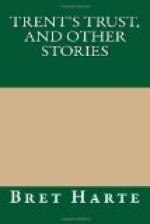“My ward—Miss Pansy Stannard,” he said with husky brevity. But drawing the child aside, he whispered quickly, “What has happened? Why are you here?”
But Pansy, child-like, already diverted by the lights, the table piled with delicacies, the gayly dressed women, and the air of festivity, answered half abstractedly, and as much, perhaps, to the curious eyes about her as to the colonel’s voice,—
“I runned away!”
“Hush!” whispered the colonel, aghast.
But Pansy, responding again to the company rather than her guardian’s counsel, and as if appealing to them, went on half poutingly: “Yes! I runned away because they teased me! Because they didn’t like you and said horrid things. Because they told awful, dreadful lies! Because they said I wasn’t no orphan!—that my name wasn’t Stannard, and that you’d made it all up. Because they said I was a liar—and you was my father!”
A sudden outbreak of laughter here shook the room, and even drowned the storm outside; again and again it rose, as the colonel staggered gaspingly to his feet. For an instant it seemed as if his struggles to restrain himself would end in an apoplectic fit. Perhaps it was for this reason that Jack Hamlin checked his own light laugh and became alert and grave. Yet the next moment Colonel Starbottle went as suddenly dead white, as leaning over the table he said huskily, but deliberately, “I must request the ladies present to withdraw.”
“Don’t mind us, Colonel,” said Judge Beeswinger, “it’s all in the family here, you know! And now I look at the girl—hang it all! she does favor you, old man. Ha! ha!”
“And as for the ladies,” said Wynyard with a weak, vinous laugh, “unless any of ’em is inclined to take the matter as personal—eh?”
“Stop!” roared the colonel.
There was no mistaking his voice nor his intent now. The two men, insulted and instantly sobered, were silent. Mr. Hamlin rose, playfully but determinedly tapped his fair companions on the shoulders, saying, “Run away and play, girls,” actually bundled them, giggling and protesting, from the room, closed the door, and stood with his back against it. Then it was seen that the colonel, still very white, was holding the child by the hand, as she shrank back wonderingly and a little frightened against him.
“I thank you, Mr. Hamlin,” said the colonel in a lower voice—yet with a slight touch of his habitual stateliness in it, “for being here to bear witness, in the presence of this child, to my unqualified statement that a more foul, vile, and iniquitous falsehood never was uttered than that which has been poured into her innocent ears!” He paused, walked to the door, still holding her hand, and, as Mr. Hamlin stepped aside, opened it, told her to await him in the public parlor, closed the door again, and once more faced the two men. “And,” he continued more deliberately, “for the infamous jests that you, Judge Beeswinger, and you, Mr. Wynyard, have dared to pass in her presence and mine, I shall expect from each of you the fullest satisfaction—personal satisfaction. My seconds will wait on you in the morning!”




